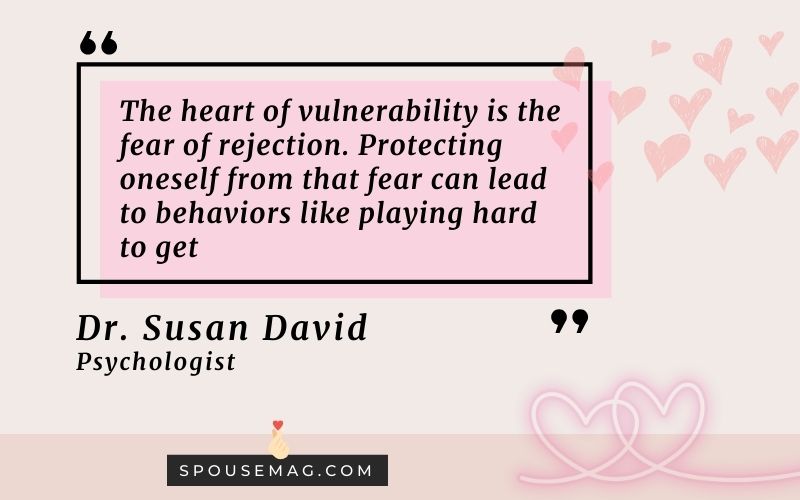
This behavior is often used as a dating strategy to make the other person more interested by appearing more desirable and less attainable.
He plays hard to boost his ego, enjoying the thrill of being pursued and testing your level of interest to check how much effort you’re willing to invest.
Sometimes, it’s about maintaining his independence or shielding himself from the fear of rejection.
Let’s explore the reasons behind this behavior and uncover what’s going on.
12 Reasons Why Would a Guy Play Hard to Get
Often rooted in insecurity and a desire to boost self-esteem, it is a strategic maneuver to test interest, maintain control, or simply savor the chase.
Social pressures, relationship anxieties, and past experiences further influence this behavior.
The reasons behind this common dating strategy are as varied as those who practice it.
Key Takeaways
- Playing hard to get often stems from a desire to boost self-esteem.
- Some individuals thrive on the thrill of pursuit.
- Playing hard to get is a tactic to build mystery and make oneself more intriguing.
- This behavior is sometimes used to gauge how invested the other person is.
Quiz: What’s a good strategy for dealing with someone who’s playing hard to get?
1. Boasting his Ego
When he’s playing inaccessible, it creates a sense of mystery and desirability, which significantly enhances his self-esteem.
Picture it like this: when he’s the center of your attention, it’s like he’s a star in this dating drama, and the adoration from you is the applause he craves.
Take John, a 32-year-old marketing manager, as an example. He explains, “I used to play hard to get because it was thrilling to see someone so interested in me, and it made me feel more desirable and powerful.”
2. The Thrill of the Chase
Like a cat who enjoys chasing a laser pointer, some guys find the pursuit more thrilling than the catch.
While the thrill of the chase is intoxicating, balancing it with authenticity and vulnerability is crucial. After all, the most rewarding relationships are built on trust, respect, and open communication, not elaborate games.
Tom, a 28-year-old marketing executive, shares, “It’s not that we’re not interested; sometimes, the chase makes the whole experience more exciting. It’s like a game of strategy, and it adds an element of fun.”
3. Building Mystery and Intrigue
Did you know that mystery and unpredictability can trigger dopamine production in the brain, making the person seem even more appealing?
By keeping you guessing about his feelings and intentions, he creates an air of mystery that makes him seem more intriguing and desirable.
He taps into this human fascination with the mysterious. It’s the excitement of trying to figure out what’s behind the curtain.
I remember dating a guy named Jake who was the king of mixed signals. One day he was warm and engaging, the next day, cold and distant. It was like trying to solve a puzzle. I found myself more intrigued by him because I wanted to uncover the truth behind his behavior.
As the famous author, Oscar Wilde, said
“The only thing worse than being talked about is not being talked about.”
4. Testing Interest
Imagine you’re both in the early stages of dating. If he’s playing hard to get, he’s not just trying to be mysterious; he’s checking how much effort you will put into winning him over.
By playing it cool, he observes your reactions and determines if you’re genuinely interested or just passing the time.
Kim, a 28-year-old marketing executive, explains, “Sometimes, it’s not about playing games; it’s about figuring out if the other person is really into you.”
He also tests your compatibility with his lifestyle and values by seeing how you respond to his inconsistent behavior.
5. Fear of Rejection
Beneath the often bravado-filled exterior of the “hard to get” player, there is a deep-seated fear of rejection.
This fear manifests in various ways, from playing it cool to avoid vulnerability to creating emotional distance as a protective pillow.
It’s a defense mechanism that allows individuals to maintain control and avoid the potential pain of being turned down.
By appearing less invested, they reduce the risk of emotional hurt.
As author and psychologist Dr. Susan David says, “The heart of vulnerability is the fear of rejection. Protecting oneself from that fear can lead to behaviors like playing hard to get.”
This fear often stems from past experiences where their advances were met with rejection or indifference. To avoid reliving that emotional turmoil, they adopt a more cautious approach.

6. Maintaining Control
Imagine a guy who often takes days to reply to texts or calls, even though he seems interested. This delay is not just about playing it cool; it’s a deliberate attempt to control the rhythm of the interaction, preventing himself from appearing too available.
It’s a psychological game where they’re always one step ahead, making you chase them.
This behavior often stems from deep-rooted insecurities.
It’s a defense mechanism that allows them to feel powerful and in charge.
Alex, a 34-year-old financial analyst, shares, “I use playing hard to get as a way to keep the upper hand. It helps me control how much I invest emotionally and ensures I’m not too exposed too quickly.”
7. Social Conditioning
From a young age, many men are conditioned by societal norms and media portrayals to be the “alpha” – the one who is less available and more cold.
This conditioning leads them to believe that playing hard is the way to win over a partner.
Fun Fact: According to a study by the University of Western Sydney, individuals who play hard to get often end up in more committed relationships, as the initial effort required to win them over can create a stronger bond.
I remember dating a guy named Chris in my early twenties who was the epitome of playing hard to get. He would take hours to reply to texts and often seemed disinterested. It wasn’t until much later that he admitted he was deeply interested but was afraid of appearing too eager.
This experience taught me that sometimes, the act of playing hard to get isn’t about disinterest but insecurity or fear.
8. Maintaining Independence
He doesn’t want to appear too available or needy. By keeping some distance, he ensures that his personal space and individuality are respected.
Sarah, a 31-year-old lawyer, recalls, “My boyfriend initially played hard to get because he valued his independence. He wanted to make sure that being in a relationship wouldn’t compromise his time and space.”
He probably takes Susan B. Anthony’s quote “Independence is happiness.” too seriously.
9. Game-Playing
Picture this: If you were watching a suspenseful movie, wouldn’t you be on the edge of your seat, trying to guess what’s going to happen next?
Similarly, guys who play hard to get are adding a bit of drama to keep the dating game interesting. It’s their way of keeping things lively and engaging.
Ryan, a 27-year-old marketing manager, shares, “I admit, sometimes I play hard to get just to keep things interesting. It’s like adding a little thrill to the chase, which makes the whole process more exciting.”
For some guys, it’s flattering to see someone make an effort, and it is a fun way to engage in the dating process.
10. Boosting Self-Confidence
By maintaining a certain level of desirability and making themselves appear in high demand, a guy feels a sense of validation and empowerment.
This behavior serves as a way to affirm their worth and attractiveness in the eyes of others.
Insight from Alex, 27, Sales Representative:
“I used to play hard to get because I thought it made me more desirable. It gave me a confidence boost knowing that others were interested in me and willing to put in the effort to win me over. “
This behavior is not sustainable and pushes away potential partners seeking genuine connections.
Is He Playing Hard to Get? Differentiating Between Genuine Disinterest and Playing Hard to Get
Let’s break down how to tell if he’s truly interested but playing it cool, or if he’s simply not into you.
1. Consistency in Communication
- Playing hard to get often involves irregular communication—texts and calls come intermittently and he might be slow to respond.
- However, if he’s genuinely disinterested, communication will be consistently lacking.
Example
You: “Hey, I haven’t heard from you in a few days. Are you free this weekend?”
Playing Hard to Get: Him: “Hey! Sorry, I’ve been swamped. Maybe we can catch up next week? I’ll let you know.”
Genuine Disinterest: Him: “Oh, hey. I’ve been busy. I’m not sure if I’ll be free this weekend, though.”
2. Effort in Engagement
- Playing hard to get often involves making a deliberate effort to keep things interesting and engaging, even if it’s irregular.
- Genuine disinterest is usually marked by a lack of effort and engagement altogether.
Example
You: “I’ve been thinking about trying that new restaurant downtown. Want to join me?”
Playing Hard to Get: Him: “That sounds fun! I’m interested, but let’s play it by ear. I might be tied up with some work.”
Genuine Disinterest: Him: “I’m not really into trying new places. Maybe another time.”
In the first example, he expresses interest but adds a layer of uncertainty, a common tactic in playing hard to get. In the second example, he outright declines, showing no interest in making plans.
3. Body Language and Interactions
- Playing hard to get often involves mixed signals—he is warm and engaging in person but distant through messages.
- Genuine disinterest typically manifests as a lack of enthusiasm in person and online.
Example
You: “It’s great to see you! How have you been?”
Playing Hard to Get: Him: “It’s nice to see you too. I’ve been good. We should hang out more often, though.”
Genuine Disinterest: Him: “Yeah, I’m fine. Just busy with stuff.”
In the first response, his body language and words are positive, suggesting he’s interested but is keeping a bit of distance. In the second response, his tone is flat and uninterested, indicating a lack of enthusiasm.
4. Response to Your Advances
- Playing hard to get often involves a calculated response, he shows interest but will make you work for it.
- Genuine disinterest is marked by a lack of response or enthusiasm towards your attempts to connect.
Example
You: “I’m planning a weekend trip and would love for you to come along.”
Playing Hard to Get: Him: “A weekend trip sounds amazing, but let me check my schedule and get back to you.”
Genuine Disinterest: Him: “That sounds like a big commitment. I don’t think I can make it.”
In the first example, he’s hesitant but not outright rejecting the idea, suggesting he’s playing hard to get. In the second, he’s uninterested and avoids making any
5. Future Plans and Commitment
- Playing hard to get involves some commitment and planning, albeit with delays or mixed signals.
- Genuine disinterest is often characterized by reluctance to discuss plans or commitments.
Example
You: “I was thinking we could plan a trip together next month. What do you think?”
Playing Hard to Get: Him: “Next month? That could be fun. Let’s see how things go and talk about it closer to the date.”
Genuine Disinterest: Him: “I’m not really into making long-term plans right now.”
Consequences of Playing Hard to Get: What Could Go Wrong?
Here’s a look at the potential fallout from this strategy and why sometimes, it’s best to skip the games and be straightforward.
1. Miscommunication Mayhem
Mixed signals lead to confusion and misunderstandings, making it difficult to build a clear and genuine connection. Over time, this creates a barrier that prevents the relationship from moving forward.
Takeaway: Clear and consistent communication is key!
2. Pushing Someone Away
If someone feels like they’re always chasing after you without getting a clear response, they decide it’s not worth the effort and move on. This leads to missed opportunities for a meaningful relationship.
Takeaway: While playing hard to get creates initial interest, it’s important to balance it with genuine engagement to avoid losing a potential partner.
3. Impact on Self-Esteem
If they’re left wondering whether they are good enough, it often leads to feelings of inadequacy and self-doubt. This damages their confidence and makes them less likely to invest in the relationship
Takeaway: Avoid playing games that undermine your partner’s self-worth.
4. Short-Term Thrills, Long-Term Chills
The excitement of playing hard to get is thrilling in the short term, but it often leads to a superficial connection.
A relationship that lacks depth and genuine engagement becomes unfulfilling over time, potentially leading to its end.
Takeaway: Focus on building a meaningful connection rather than creating short-term excitement.
5. Missing Out on Real Connections
By playing hard to get, you miss out on forming a genuine connection with someone who could be a great match.
Takeaway: Be open to authentic connections and avoid letting games prevent you from exploring potentially great relationships.
Conclusion
Understanding why someone plays hard to get offers a glimpse into the complexities of human interaction.
While it is tempting to dissect every move and message, it’s essential to remember that individuals are unique.
What might seem like a calculated game to one person could be nerves or past experiences for another.
Ultimately, the most fulfilling relationships are built on open, honest communication.
While the allure of the chase is intoxicating, genuine connection and trust are the cornerstones of lasting love.
Instead of wasting energy deciphering cryptic signals, focus on building a foundation of mutual respect and understanding.
Remember, the best relationships are where both partners feel seen, heard, and valued.

As a married wife, founder, and editor of SpouseMag.com – these guides are based on my own personal experiences, observations, research and insights. I am transparent about being inspired by the life and work of the two greatest experts in the relationship space – Dr. John and Julia Gottman, and Harville and Helen. They two are some of the strongest couples, researchers, authors, and counselors when it comes to marriage and relationships. My advice and guides are based on my insights and research, and they are not an alternative to professional advice.






